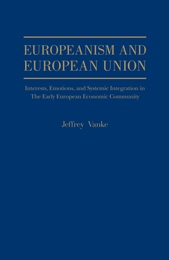Europeanism and European Union: Interests,Emotions and Systemic Integration, in the Early European Economic Union,1954 - 1966
Ph.D, History, Harvard University
 The fact of postwar European integration is only half of an extraordinary story. The six founding countries were unique from their neighbors and from their own histories. After 1945, the Six recast their nationalisms not only to discard extremism, but also to adopt Europeanism -- an emotive drive to create unprecedented institutions of European unity. At the intersection of their Europeanized nationalisms and their interests, the Six founded the European Economic Community, the core of today's European Union (EU). The early Community answered security and economic concerns. But the place and timing of its postwar founding point to the third and crucial force, emotive solidarity. Only the Six transformed very strong national solidarity communities to include medium-strength European solidarity as an essential, broad, and deep national characteristic.
The fact of postwar European integration is only half of an extraordinary story. The six founding countries were unique from their neighbors and from their own histories. After 1945, the Six recast their nationalisms not only to discard extremism, but also to adopt Europeanism -- an emotive drive to create unprecedented institutions of European unity. At the intersection of their Europeanized nationalisms and their interests, the Six founded the European Economic Community, the core of today's European Union (EU). The early Community answered security and economic concerns. But the place and timing of its postwar founding point to the third and crucial force, emotive solidarity. Only the Six transformed very strong national solidarity communities to include medium-strength European solidarity as an essential, broad, and deep national characteristic.
Vanke explains and interprets the turning points in this process. And he undertakes a broad four-country comparison of political leaders, parliamentarians, newspaper columnists, and public opinion, to demonstrate the startlingly similar expressions of a "European family" between the Dutch, West Germans, and even the French, in sharp contrast to the British. Ironically, the transformed nationalisms themselves sustained Europeanism, not to displace nationalism but to reshape it. So concerned to integrate their countries, leaders in the Six tried several formulas until they found what worked, long after their neighbors rested satisfied with looser international organizations. From 1947 through the present, the founding Six nations have polled much more in favor of European union than have their neighbors. And Europeanism is so integral a part of their nationalisms, so sacralized and unassailable, that EU membership is overwhelmingly beyond reproach. Vanke's book tells why and how this came to be.
Vanke earned his Ph.D. in History at Harvard University. Europeanism and European Union is grounded in research in five languages, in nine countries, in some fifty archives.
ACADEMICA PRESS
1727 Massachusetts Avenue, NW, Suite 507
Washington, DC 20036
